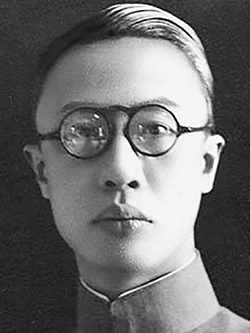
Cause of death: cancer
Puyi (7 February 1906 – 17 October 1967) was the last emperor of China, reigning as the eleventh and final monarch of the Qing dynasty. He became emperor at the age of two in 1908, but was forced to abdicate in 1912 as a result of the Xinhai Revolution at the age of six. During his first reign, he was known as the Xuantong Emperor, with his era name meaning "proclamation of unity".
Puyi was briefly restored to the Qing throne by the loyalist general Zhang Xun from 1 to 12 July 1917. He was first wed to Wanrong in 1922 in an arranged marriage. In 1924, he was expelled from the Forbidden City and found refuge in Tianjin, where he began to court both the warlords fighting for control over parts of the weak Republic of China and the Japanese who had long desired control of China. The Japanese invasion of Manchuria in 1932 resulted in the puppet state of Manchukuo being established by Japan, who chose Puyi to become its chief executive, using the era name "Datong".
In 1934, he was declared emperor of Manchukuo, prompting writer Wen Yuan-ning to quip that Puyi "holds the world's record for the number of times that any mortal may ascend and abdicate the throne". Puyi nominally reigned under the era name "Kangde" until the end of the Second Sino-Japanese War in 1945. This third stint as emperor saw him as a puppet of Japan; he signed most edicts the Japanese gave him. During this period, he largely resided in the Manchukuo Imperial Palace, where he regularly ordered his servants beaten. His first wife's opium addiction consumed her during these years, and they were generally distant. He took on numerous concubines. With the surrender of Japan in 1945, Puyi fled the capital and was eventually captured by the Soviets who had occupied the country; he was extradited to the People's Republic of China in 1950. After his capture, he never saw his first wife again; she died of starvation in a Chinese prison in 1946.
Puyi was a defendant at the Tokyo Trials and was later imprisoned and re-educated as a war criminal for 10 years. After his release in 1959, he wrote his memoirs (with the help of a ghostwriter) and became a titular member of the Chinese People's Political Consultative Conference and the National People's Congress of the People's Republic of China. His time in prison greatly changed him, and he expressed deep regret for his actions while he was emperor. He died in 1967 and was ultimately buried near the Western Qing tombs in a commercial cemetery.
Source : Wikipedia